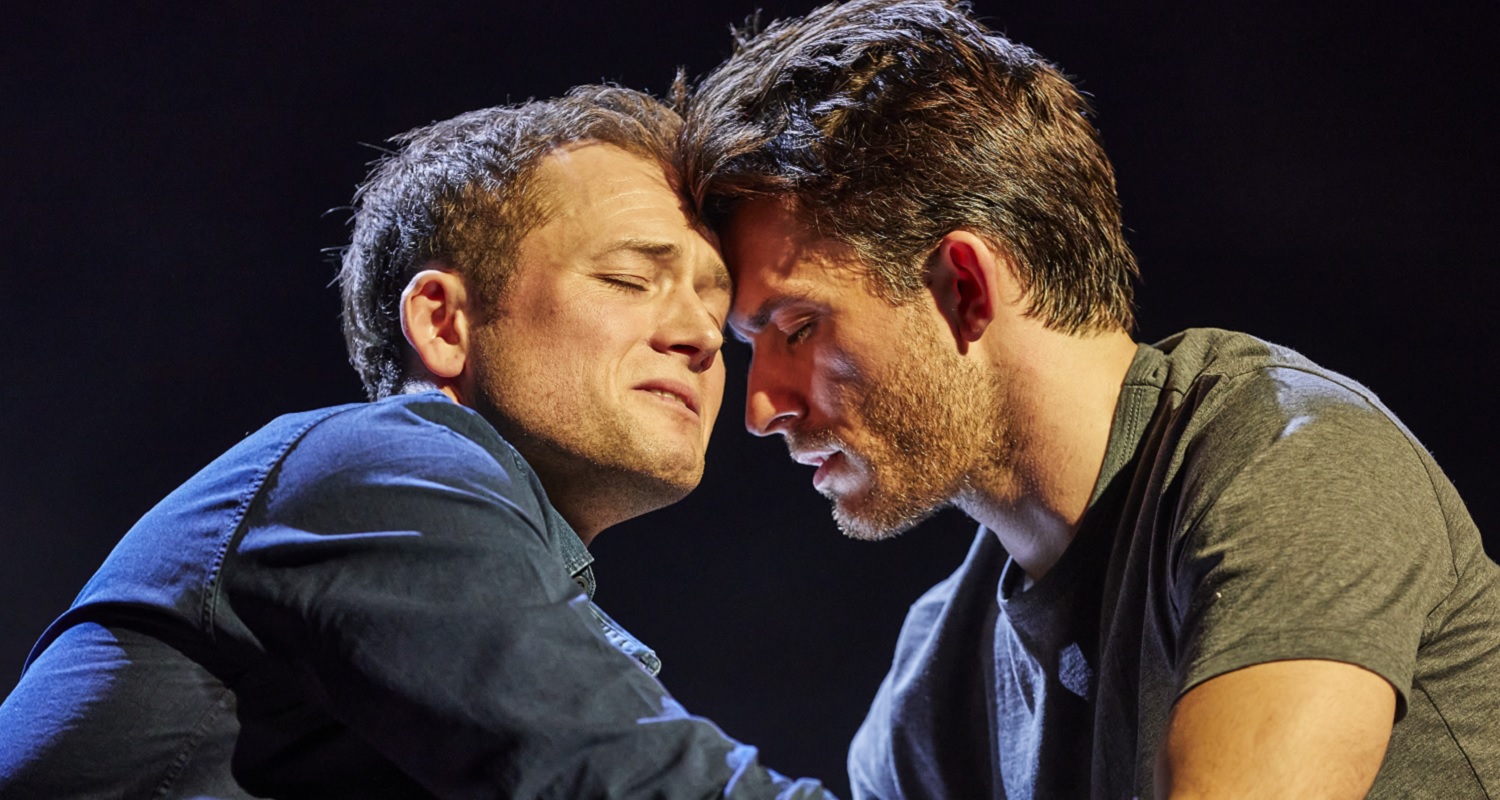Cock review: ‘Jonathan Bailey and Taron Egerton’s cocksure sex comedy is a hit’
The Bridgerton and Rocketman actors play bickering boyfriends redefining their relationship in this riotous comedy, writes Attitude's Jamie Tabberer

Words: Jamie Tabberer; Images: Brinkhoff-Moegenburg
Could the casting of Cock be described as, well, cocky? I mean that in the best way: the stars literally aligned in the West End last night, as two of the country’s most popular actors – Bridgerton’s Jonathan Bailey and Rocketman’s Taron Egerton – took to the stage as bickering boyfriend twins, in this this hotly anticipated revival of Mike Bartlett’s domestic dramedy (which you can get tickets for here).
The guys play the relatable and recognisable John and M: the kind of inconceivably charming, competitively sarcastic duo you just know have epic make up sex; a couple so disgustingly handsome, there should really be nothing to fight about.
Simultaneously, they’re dissatisfied. Having spent so long in each other’s Topman chino pockets, they’ve reluctantly morphed into each other – and as if by magic, Jonathan and Taron somehow conjure the kind of mirrored energy that blesses and curses many a long-term relationship.
Having trundled along as such for most of their 20s, an identity crisis lays bare huge discrepancies – “we’re fundamentally different individuals!” decries John, stating the bleeding obvious – and a growing power imbalance that’s painful to behold.
Things start out in classic sitcom territory. They constantly read each other to filth – think Derek Jacobi and Ian McKellen in Vicious – with John, the more ‘affected’ of the two, particularly skewered by M. Egerton is ballsy here, not to mention deliciously comedic: his inner-Kenneth Williams sails close to the winds of gayface, and thrillingly so; as one mean gay parodying another, there’s a justified ridiculousness to his performance.

The couple’s seven-year-itch is prickling by the time Russell Tovey enters the fray as an irresistibly charming… oh wait, that’s last year’s Constellations, a similarly intimate portrait of two men in crisis. Instead, Bartlett’s ahead-of-its-time script defies expectation by having a woman, W, attract John’s wandering eye: cue the commanding presence that is Jade Anouka, whose crackling chemistry with Bailey (and later, Egerton) is the hinge the play’s success depends on. Imagine the disastrous consequences if Anouka and Bailey hadn’t clicked!
The fearless pair lay claim to the play’s big crescendo moment: an astonishing, elemental sex scene semi-represented through dance. It’s almost a total car crash, but the audience noisily loved it, only pushing the pair’s (ahem) cockiness further. Movement, choreography and a blank, rotating stage propel the narrative further.
That said, the plot becomes from more conceited than a 90s soap opera – not that I’m complaining. The twists and turns are funny and entertaining, and consciously so. (“This is becoming a farce!”) Phil Daniels’ arrival as M’s protective dad, all thick London accent, wry charisma and clumsy but well-meaning grasp on gay issues, only ups the EastEnders energy.
Elsewhere, discussions around sex (do you know what a ‘gap-on’ is?) are riotously funny, and about as deep as a teen sex comedy. That said, there’s nothing shallow about the play’s central exploration of bisexuality – or, as John makes an impassioned case for: emancipated, label-free sexuality. (A sequel that looks at gender in the same way could be immensely valuable.)

In fact, the insight is so unusual, I ended up wishing it went further, and made a grander statement. After all, gay men have as much right to question their sexualities as anyone – but how many of us are disinclined to do so, after the stress of coming out the first time; after developing otherwise platonic relationships with women?
Written today, I wonder if John, M and W’s shared conundrum might be treated with more sympathy. The play’s title, after all, seems to describe the characters’ nastiness rather than a phallus, and was indeed inspired by cockfighting. M, ostensibly the play’s victim, is especially hard to root for, given the outdated, misogynistic zingers he aims at W.
John, meanwhile, could be commended as heroic were it not for his selfish and petulant indecision that tests the patience by the end. That Bailey makes the character likeable at all is down to his preternatural charm, and as the hyper-verbal John, he demonstrates the same improbable grasp on rapid-fire dialogue as in Company, his previous West End hit with Cock director Marianne Elliott. Granted, he fluffed one line last night, but it was during a scene of gigantic passion and styled out expertly.
Still, this might have been assuaged had the emotionality ran a little slower in the first two thirds. But the choice to have John’s stressy silliness and self-indulgent intensity go from 0-60 from the off is clear. You can’t look away – but after 90 minutes of constantly raising the stakes, and despite killing it throughout, Jonathan does appear like he’s been through a war. And in a way, he has.
There’s not much to say beyond the near-perfect performances, with staging minimal save for a curved, mirrored backdrop that accentuates John’s confinement and warps the characters’ reflections as if revealing who they really are. One complaint, though: I arrived at the theatre early and was tortured by needlessly loud music played on a loop. The things I’ll do for Cock!
Rating: 4/5
Cock is at London’s Ambassadors Theatre until Saturday 4 June 2022. For tickets click here.
